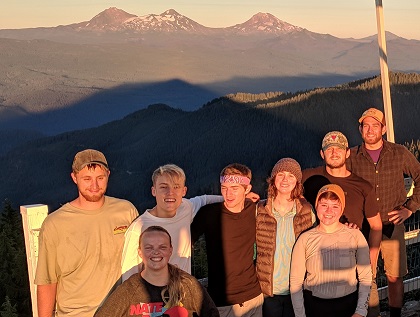Thanks for your interest in the EISI. We regret to announce that the program was not renewed in 2019. We are considering alternative options for funding the program in the future, but will not be able to support students until further notice. Many thanks to NSF for 12 great years, and to all of the students who participated.
The EISI is an NSF-funded Research Experience for Undergraduates (REU) program that supports students from computer science, mathematics, ecology, earth science, engineering, and statistics. Students work in interdisciplinary teams to conduct field work at the HJ Andrews Experimental Forest. The students then analyze the “big data” developed at the Andrews to apply cutting-edge methods and models for investigating the dynamics of plant-pollinator networks and of river networks.
Take advantage of the undergraduate research opportunity to gain experience in compelling landscapes and interact with other talented students while exploring new fields of study, including: botany, climate science, computer science, ecology, engineering, fisheries, forestry, mathematics, statistics, water resources, zoology, and many others!
If you are considering graduate study or a professional career in environmental science, computer science, or mathematics, you should be aware of the exciting opportunities and new career pathways that you could follow through integrative study. Developing skills in collaboration and hands-on experience is one of the most valuable learning opportunities you can have. This summer, Oregon State University (OSU) will offer 8 students from all over the U.S. the opportunity to work with faculty mentors on research projects that advance knowledge and understanding of old-growth forests, streams, and other native ecosystems.
The Research Experience for Undergraduates program runs for ten weeks from the middle of June to early August, see the Current Projects page for specifics, at the HJ Andrews Experimental Forest on the beautiful McKenzie River and at OSU in Corvallis.
Eco-Informatics:
Eco-Informatics, defined as the integrated application of mathematics, computer science, statistics, and engineering to the study and management of ecosystems, is an emerging field that re-integrates the ecological sciences with information sciences through conceptualizing and modeling of complex ecosystems; software engineering for model construction and experimentation; information management and access; spatio-temporal database systems; data mining; and pattern recognition. Students trained in interdisciplinary Eco-informatics are needed to understand and apply state-of-the-art tools to detect, evaluate, and predict ecological patterns and processes, and manage complex ecosystems.
Nature of the Summer Institute:
Building on the former IGERT in Ecosystem Informatics, including participants from the US Forest Service and other resource management agencies in the Pacific Northwest, students will undertake research in compelling and complex resource management issues involving land use change, climate change, water, forests, streams, wildfire, and endangered species. The Summer Institute will target recruitment of underserved student populations of Native Americans, Hispanics, and women, and will provide career development activities illustrating career options in academia, agencies, and the private sector. Through this integrated research and education, effective mentoring, and hands-on experience, participants will gain the foundation and opportunities to develop and seek support for their own graduate program, including a peer-reviewed research proposal, as well as the training to become outstanding interdisciplinary scientists and effective contributors to Eco-Informatics science.


